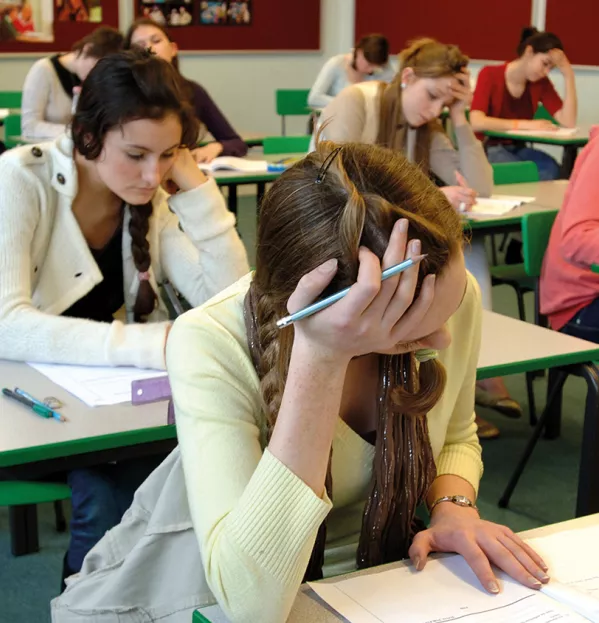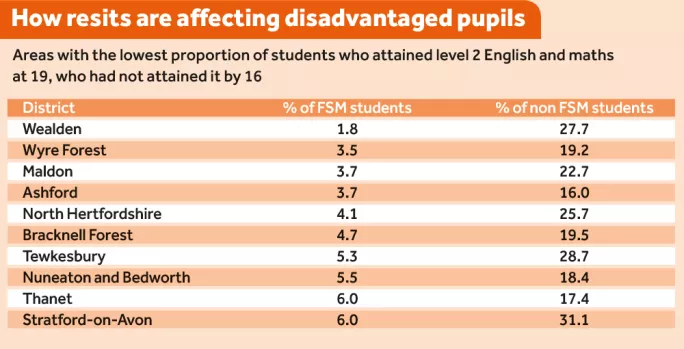Gulf in resits leaves most disadvantaged cast adrift

Since it became a condition of colleges’ funding that young people who narrowly failed to achieve a good pass in GCSE maths or English be required to retake the subject, concerns have been growing that the policy could be short-changing many of the learners most in need.
A Tes analysis of new data released by the Department for Education reveals massive disparities across England in the proportion of young people who, having failed to obtain a grade C grade or 4 in both subjects at school, go on to achieve this by the age of 19.
The statistics for 2015-16 - the year in which the condition of funding was brought in - reveal that not only do significantly fewer young people entitled to free school meals (FSM) achieve the expected standard by age 19 in comparison with the rest of the population, but also large variations exist across different parts of the country.
Regional divide
In the most extreme case - Wealdon in East Sussex - 1.8 per cent of those with free school meal entitlement who did not achieve a C grade in both subjects at 16 went on to achieve this by the age of 19, a fifteenth of the rate for their better-off peers (27.7 per cent). Other districts with low success rates among the most disadvantaged young people include Wyre Forest, Maldon and Ashford. In these areas, fewer than 4 per cent of young people without a C in English and maths at the age of 16 went on to achieve this by 19 (see table, left).
At the other end of the spectrum, in Blaby, Leicester, the attainment rate among FSM-entitled students was almost 44 per cent.
At present, all students who fail to obtain a C or 4 are required to work towards achieving this. Those who obtained a grade D or 3 are effectively forced to retake the qualification, because of the funding rule for colleges.
College leaders have argued that forcing young people to resit GCSEs can be detrimental and that more applied qualifications, such as functional skills, would be a better alternative.
Across the old and new versions of GCSEs, there were more than 327,000 English and maths entries among 17-plus students this summer. In the final sitting of the legacy qualification, the A*-C pass rates were 24.4 per cent and 29 per cent in maths and English, respectively.
Not getting results
NUS students’ union president Shakira Martin says the new statistics show that the GCSE resit policy “disproportionately affects people from disadvantaged backgrounds” and is “seriously detrimental to social mobility”.
The emphasis “should be on ensuring students are able to study maths and English in the way that is most appropriate to them,” she adds.
In Thanet, Kent, 6 per cent of students achieved a C in English and maths by 19, of those who did not achieve this in school.
East Kent College principal Graham Razey says the figure demonstrates the “significant challenge for post-16 education providers that accept students who have no English or maths GCSE at C or above”.
“More targeted funding and policy revision might be ways to help to ensure the gap is closed at a faster rate, helping boost outcomes for these students and their wider communities,” he adds.

In St Edmundsbury, Suffolk, 23.4 per cent of young people achieved Cs in English and maths by 19. Lindsey Johnson, vice principal for curriculum and quality at West Suffolk College, says the “forced GCSE resit policy is not conducive to developing the maths and English skills of all young people”.
“We’ve invested significantly in wrap-around services for [learners from disadvantaged backgrounds], such as young people having personal tutors. That is at a time where other colleges may have cut back on those services.”
Association of Colleges deputy chief executive Julian Gravatt says: “The data shows that the GCSE resit policy isn’t working for those from deprived backgrounds and I would add that it doesn’t help that DfE cuts funding by 20 per cent between Year 11 and 12 and stops the Pupil Premium at that point.”A spokeswoman for the Department for Education says: “Students who achieve a good level in maths and English increase their chances of securing a job, an apprenticeship or progressing to further study. We are working closely with post-16 institutions to address issues that are holding back the progress of students in securing the basics of maths and English.”
You need a Tes subscription to read this article
Subscribe now to read this article and get other subscriber-only content:
- Unlimited access to all Tes magazine content
- Exclusive subscriber-only stories
- Award-winning email newsletters
Already a subscriber? Log in
You need a subscription to read this article
Subscribe now to read this article and get other subscriber-only content, including:
- Unlimited access to all Tes magazine content
- Exclusive subscriber-only stories
- Award-winning email newsletters